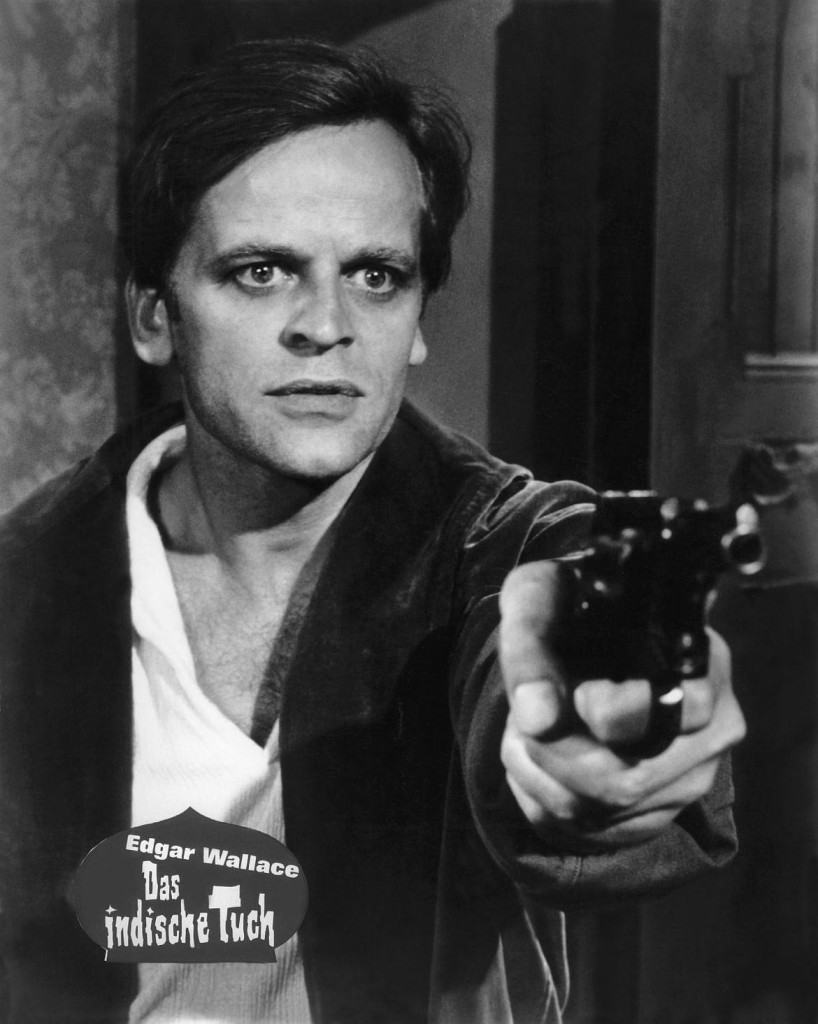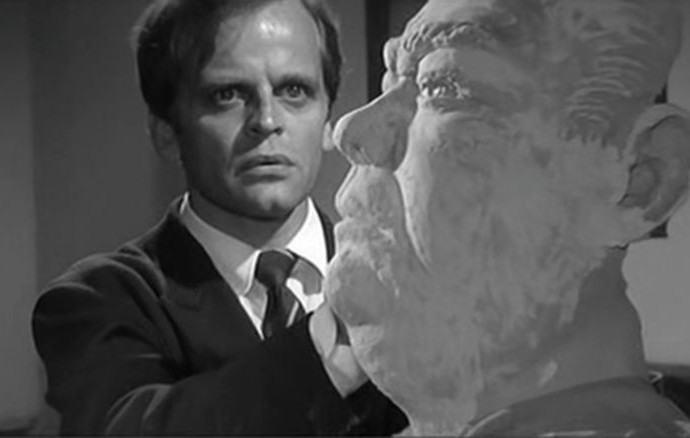Dir: Alfred Vohrer
Star: Heinz Drache, Corny Collins, Eddi Arent, Klaus Kinski
Definitely a strong Agatha Christie vibe here, as various relatives of the late Lord Lebanon arrive at his remote estate in the far North of Scotland, for the reading of his last will and testament by lawyer Frank Tenner (Drache). Except, it turns out actually to be his Lordship’s penultimate will and testament, telling the wannabe inheritors that they have to stay in the mansion for the next six days and nights, before the actual last will gets read, dividing up the loot between those who have remained. Which, considering the considerable degree of antipathy between the contenders, is apparently intended to thin out the herd. However, a storm cuts the estate off from the outside world, and it soon becomes clear that someone is intent on shrinking the field even further, strangling the residents, one by one, with the aid of the titular cloth. Which of the relatives, many of whom seem to have their issues, is responsible?
There’s a sense the makers here aren’t taking things entirely seriously, most clearly in a final twist where Lord Lebanon’s plans for his inheritance become clear. But even before that, I got the feeling they were aware of the well-trodden path down which they were going, most famously in Christie’s Ten Little Indians. A factor here is the soundtrack, by Peter Thomas, which feels as if has strayed in from a completely different film, most likely Carry On Strangling – this is most apparent when someone is spying on a woman undressing, from a secret passage in her wardrobe, which I almost expected to be punctuated with a Sid James-like “Phwoooar!” There are other aspects which are similarly tongue in cheek, such as a painting of a naked woman, whose nipples can become eye-holes through which the murderer can peep.
 That said, I can’t say, I minded this self-aware attitude, which has probably stood the test of time better than a straight “mystery” approach would have, and largely inoculates the film against some of the more obvious criticisms that could be leveled at it. For example, it’s clearly an extremely cheap production, without a single exterior shot: the closest you get are some very obvious drawings of the manor seen from the outside, with smoke being blown across them. Taken seriously, these would be woeful indeed; instead, they set things up nicely, almost adding to the sense of meta-satire here. The characters here are similarly almost deliberately cliched, stereotypes of the field, running the gamut from the doting mother and her neurotically “gifted” son, all the way to… Klaus Kinski.
That said, I can’t say, I minded this self-aware attitude, which has probably stood the test of time better than a straight “mystery” approach would have, and largely inoculates the film against some of the more obvious criticisms that could be leveled at it. For example, it’s clearly an extremely cheap production, without a single exterior shot: the closest you get are some very obvious drawings of the manor seen from the outside, with smoke being blown across them. Taken seriously, these would be woeful indeed; instead, they set things up nicely, almost adding to the sense of meta-satire here. The characters here are similarly almost deliberately cliched, stereotypes of the field, running the gamut from the doting mother and her neurotically “gifted” son, all the way to… Klaus Kinski.
I was on tenterhooks early on, wondering how long his character was going to survive, what with it being an “early” Kinski role, and this being very much an ensemble cast, in a story with a high mortality rate. Not that late Klaus performances are of necessity much more significant: given enough financial incentive, he would happily turn up and work in minor roles, his presence splashily exaggerated across subsequent promotional material. It would have been no surprise here if he had been an early victim of the strangler, though to be honest, this has enough entertainment value elsewhere that his quick departure would not have been a fatal blow. While I will remain vague on specifics, to avoid spoilers, I will say that he is not the first actor to collect his check, and the film contains a sufficient helping of Klaus to meet your daily nutritional requirements.
He plays Peter Ross, the illegitimate son of Lord Lebanon, who is now making a living as a sculptor, so while hanging out at the castle, has been working on an extremely large piece, based on a life mask, cast from one of the aristocrat’s servants. However, both it and Ross appear to contain dark secrets, for the bastard (for once, used literally, rather than as an epithet applied to the actor by a wronged director!) is seen sweating profusely and shooting up, which allows Kinski to demonstrate his glorious ability to act all twitchy and moist. It’s one of the more creepy performances of this era in his career, and Ross is certainly a credible killer – but does it necessarily indicate he is actually the murderer, or is it all a massive red-herring, intended to divert the viewer’s attention away from the real killer?
Hey, you can’t expect to hand over all the movie’s secrets, can you? If the film had sucked, I’d probably have been more than happy to spill the beans, but I feel warmly enough toward the makers that they deserve a better fate. Sure, the ambitions on view here may be extremely low, but when your resources are limited, that’s not necessarily a bad thing. For what this is, it succeeds on its own terms to a greater degree than most movies, and can only be appreciated for that.
